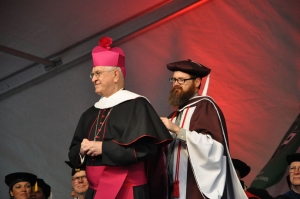What are the chances that graduates and their guests will listen to your commencement address? I have two chances to find out. Last Saturday I delivered the address to the record 600 + graduates from Bellarmine University, and the next Saturday I’ll travel to DeSales University outside of Allentown, Pennsylvania to speak on the 50th anniversary of the founding of the University.

Dr. Gregory Hillis, associate professor of theology at Bellarmine, assisted Archbishop Joseph E. Kurtz with his academic garb. Archbishop Kurtz received an honorary doctoral degree at the ceremony. (Record Photo by Jessica Able)
I served as trustee at the latter during the 1990s. When I visit, I also will recall my first assignment in 1971 as deacon just a few miles from the campus when the University was in her first decade of existence. At Bellarmine, I had the bittersweet opportunity to ask for prayers for President McGowan, who died so suddenly, and to give thanks for his legacy of more than a quarter century.
The sheepskin will have the graduates’ attention. How hard they worked and how much they sacrificed for that diploma! Hang onto that diploma, I will tell the graduates, but make sure to take some university tools with you as you go forth.
In his 2015 Road to Character (well worth the read), David Brooks distinguishes between two types of virtues: resume virtues and eulogy ones. The former virtues, likely on the mind of most graduates, involve the art of “putting your best foot forward” – listing the winning qualities that will land a great job. We are told that today’s graduates believe in themselves and find it natural to sell their best selves to an employer. Good for them!
However, the New York Times columnist Brooks spends little time on those virtues as he invites the reader to build character. Instead he speaks of those virtues or qualities that last into eternity and the very same that people recall long after the person has died (hence “eulogy virtues”).
You can guess the list: faithful love, sacrificial service, diligence and patience, humility, and selflessness. So how do I recommend to graduates that they develop these virtues, which were cultivated in them during their university experience? I offer four tips:
1. Take with you the name of the teacher who influenced you for the better. A Catholic university at her best with her finest teachers has that gift of inspiring a clear way of thinking (inquiry and dialogue) with a humble witness to a life of faith. I recently read that while there is no such thing as “Catholic biology,” a Catholic university gives permission for the wonders that science discovers to be the occasion for genuine praise of the creator. If you were blessed with a teacher who imparted the thirst for knowledge that leads to a deeper faith, give thanks. Get his or her address and write to say thank you within ten days.
2. Take with you the names of good friends you have made through your college years. As I never tire of telling Confirmation classes, a good friend is a jewel who always brings out the best in you. They are easy to discover, because in their presence you are a better person. We naturally imitate good friends, so make the commitment to cherish these individuals and put your gratitude in writing within the next 5 days.
3. Take in a deep breath of gratitude for your family, especially your parents. Pope Francis calls the Church, a family of families, and 35 year ago St. John Paul II said that “the future of society passes through the family.” Your future is in great measure due to your dear and committed family members. Don’t let this day end without saying thank you. By the way, the greatest incentive to prayer is not an act of desperation 10 minutes before a final that was sloppily prepared for! No, it is that deep sense of gratitude that wells in your heart as you give thanks for mom and dad, grandparents, and dear ones. Let a brief silence well in your hearts right now and offer a prayer of gratitude: “Jesus, make me grateful for my family as you were for Mary and Joseph, the Holy Family.”
4. The final item on the list: Do not be afraid to aspire to greatness. After hearing a fine sermon in Washington, D.C. one Sunday morning, President Lincoln was asked what he thought of the message. He described the message as having excellent content with great eloquence. When asked if it was a great sermon, he answered; “No. The preacher forgot the most important ingredient. He forgot to ask us to do something great!”
Your greatness will be found in some heroic act of serving another. If you can discover this gift, you will uncover in your life the most valuable reward – that intangible but always recognized life of joy. Joy is a gift not given to those who search the earth looking for it – for them it is always around the next corner. No, it is the gift that shows up in your heart when after serving others well, you realize that living for another seems to bring joy like a strong wave brings a peaceful wake. It comes from one who does something great for another.
Don’t be anxious. Don’t fret. Jesus said, “Do not be afraid.” His hand guides, and he has already provided. Just think of that teacher, those good friends, that wonderful proud family. His hand is in it all.
Graduates, go forth – sheepskin in your hand and those special people in your heart. Be all that God has created you to be. St. Catherine of Siena said it well: “Be all that God has created you to be, and you will set the world on fire.” Discover how to serve others and concentrate on what is truly lasting. Go forth and God speed! Amen.



